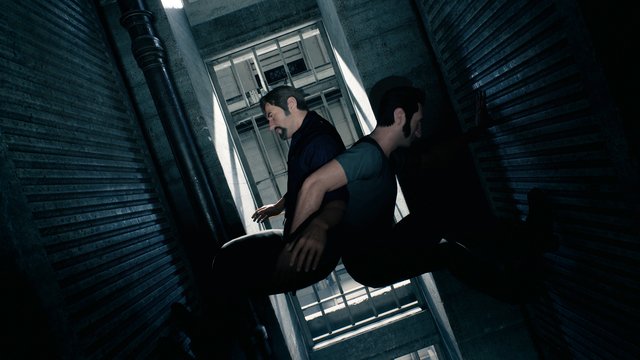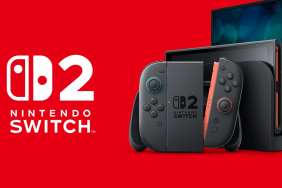“Listen, listen! This is me talking! Listen.”
Director Josef Fares giddily said this as he guided me towards a non-playable character that he voices in his upcoming co-op, narrative-driven game, A Way Out.
“Doctors have a lot of stuff I can get high on!” said Fares’ character before real-life Fares started cracking up right next to me. Even though he’s probably heard this line dozens of times by now —including the time it came out of his own mouth — he still laughed with equal parts pride and excitement. It felt like the same pride and excitement that Fares demonstrated in his infamous “Fuck the Oscars” speech at The Game Awards in 2017, where his jetlagged passion overrode his tongue and gave everyone an unexpected but welcome break from the typical award show routine. And after playing about an hour of A Way Out with him, I understand why he’s so enthusiastic about his game even if I couldn’t quite see the full picture for myself during the intentionally jarring demo.
A Way Out Preview: A Tale of Two Strangers
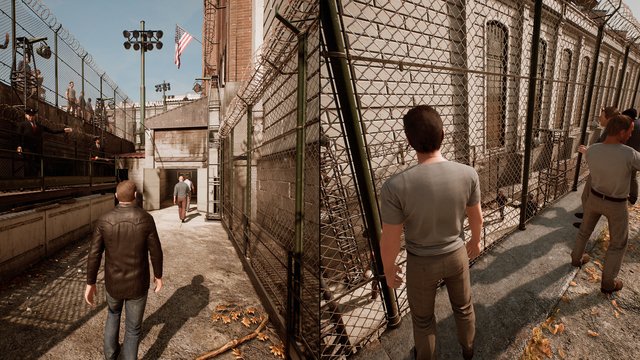
A Way Out is a co-op-only (online or local) game where two strangers, Leo and Vincent, have to grow to trust each other in order to achieve their goals. Vague, I know, but it’s a type of game that heavily leans on spending time with the characters and witnessing their relationship naturally unfold. However, that format isn’t very preview-friendly, especially in the sporadic way we played the demo. Fares simultaneously wanted to show me all of the game and none of it. Every time we got settled into a level and completed a short segment, he’d hurriedly exit out to avoid spoilers and assure me that it would make sense within the context of the full game; a luxury I obviously wouldn’t have until the game launched.
“I really don’t want to show this,” admitted Fares as he loaded into our second scene. “I just want people to play it.”
Even though this approach nullifies a grander sense of character growth that this game seems built on, it instead allowed me to focus on the smaller, moment-to-moment chunks of gameplay. Fares was quick to point out how each mechanic was used once and then dropped, much like his first game, Brothers: A Tale of Two Sons. Recycling bits wasn’t something he was interested in, as evidenced by the wide range of activities we did. We used stealth to evade the police, crafted a spear to fish, fought hospital guards in a slick, Oldboy-like hallway fight, and even faced off in a non-copyright infringing version of Connect 4. While it didn’t control poorly, don’t expect to sneak as smooth as Snake or to punch as fluidly as Batman; it’s not going for that sort of depth or complexity. And while having no consistent mechanical backbone might be alarming to some, Fares made it clear that he wants to make an experience with as little repetition as possible, something that frustrates him about most modern games.
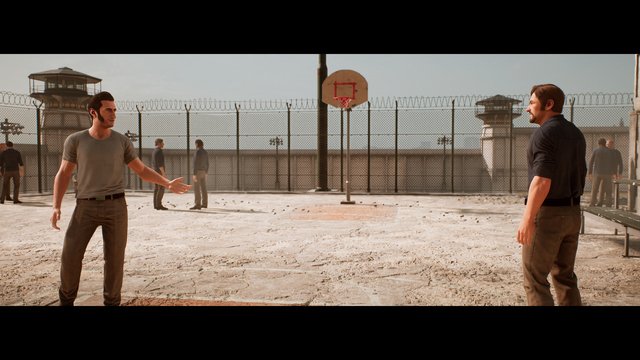
“Sometimes I call [open-world games] open-repetition games. Even a game like Zelda [Breath of the Wild] which I think was a great game, it was still too repetitive for me,” said Fares. “I would rather have shorter games that are more diverse and interesting than the opposite.
But that’s not to say that the game is short. Fares claimed that A Way Out is around seven to eight hours; roughly two and a half times longer than Brothers. Brothers had a fictional language and no branching paths and that lean linearity was part of the game’s appeal; short, sweet, and easy to beat. Despite the game’s small budget, A Way Out has a wider scope than Brothers since it’s fully voiced and offers unique personality-specific interactions and choices for both Leo and Vincent. For example, when a suspicious guard confronted us, we had two options: Leo’s idea to knock him out or Vincent’s plan to play it cool. Thankfully, A Way Out has no veto system nor does it reward the person with the fastest fingers; you actually have to talk it out and both agree on the same choice in order to move on. It’s fitting for a game so heavily focused on co-op. After a short deliberation, we went down Leo’s brutish path and punched the guard into an early nap.
A Way Out Preview: A Different Kind of Co-op
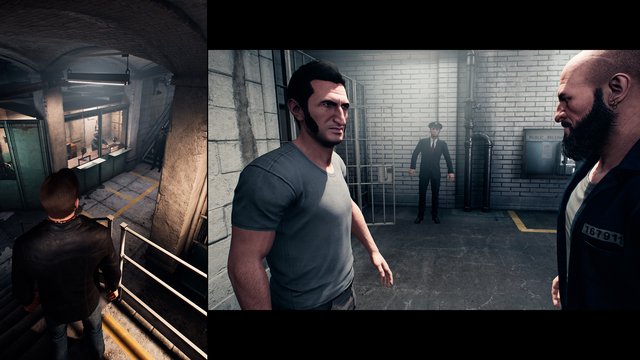
Fares said he had always wanted to play a story-driven co-op game with “characters you actually feel for,” so he decided to make his own. Co-op games usually go down the Destiny or Monster Hunter World route by acting as glorified chat rooms that heavily focus on repeatable, loot-driven missions. Player-generated stories take precedence over deep narratives in co-op since building your character with your group of friends fits more in line with the general perception of cooperative gaming.
But there have been “cooperative” single-player games before where the player builds a connection with another character during gameplay. Prince of Persia, The Last of Us, and the Uncharted series all built unforgettable bonds between characters in a story-driven environment. Fares said the latter two were big inspirations, which is evident in how Vincent and Leo bicker and exchange smartass remarks during gameplay. Baseball, arm wrestling, and other optional mini-games will also help foster the characters’ relationship through the cooperative mechanics, something Fares wanted to see more in games. He explained that he’s not as into the Telltale-style of passive storytelling and wants his game exercise the power of the medium and be an active story players experience together.
“We experience movies together and normally we experience stories together.” said Fares. “I think it’s underestimated; the power of what you can do in co-op in telling stories.”
There is a novel appeal of telling a story in co-op since we don’t see it as often as we should. A Way Out has a decent chance of pulling off this bold concept relatively well, given the brief glimpses of the characters I saw during my session with the game. But the demo, in its purposely fragmented form, didn’t give the vital context of how the gameplay connects to the narrative and vice versa. The single-use mechanics change up the pace well but they’re mainly supposed to facilitate an active connection between the players and the protagonists. Without that context, they’re just simple mini-games robbed of their overarching purpose. However, any relationship-dependent game, like Brothers or The Last of Us, also wouldn’t accurately portray a growing bond if it was carved up and delivered in a similarly scattershot way. And that gives me hope, especially since all the individual pieces of A Way Out showed promise. We just need to see if those parts are similarly promising when they come together in the full game.
